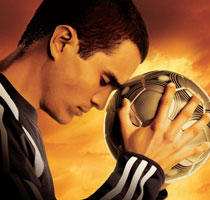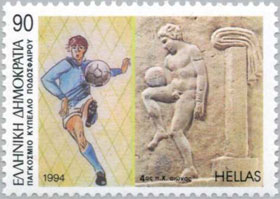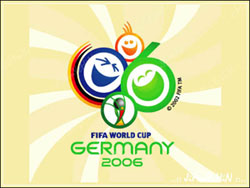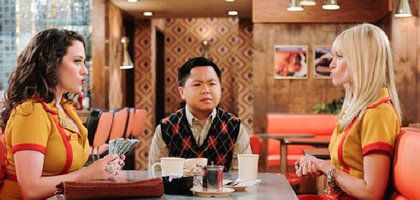Goal!《一球成名》(精讲之五)
|
Download 影片对白  Gavin: All right, geezer? Santiago: Hey. Gavin: Hey, man, thanks for covering for me, yeah. You're a top man. If you fingered me, I was right in the shitter. Santiago: We're even, OK? I don't owe you no more favors. Gavin: OK. Santiago: You're screwing up your life, man. That's how you lost Christina. Gavin: She'll be back. Santiago: No, she won't. You know why? 'Cause she can't stand your asshole friends. How do you think that picture ending up in the paper? Bluto sold it. And how much does your other buddy make dealing drugs at all the fancy places you get him into? Hey you think I'm some greaseball who doesn't know stuff? These are probably the best years of our lives and how long have we got? Ten, if we're lucky? Or even less, if we get hurt like Jamie. And it can happen to any of us. Just like that, We're one tackle away from flipping burgers. Gavin: Get out. Go on, piss off. Gavin: Hey, boss. Can I have a word? Dornhelm: Yes, please. Gavin: Yes, I was the other bloke in that picture. Dornhelm: I'm shocked. Gavin: And I thought you should know it was me that dragged Santi also to that party to begin with. He didn't even wanna go. So it's not his scene. He's a good lad. I take full responsibility. Dornhelm: Boys with big bank accounts are still boys. This is not an excuse for you any more. You're how old? Gavin: 28. Dornhelm: 29, I think. Gavin: Yeah. Around that. Dornhelm: The young players should be looking to you for an example. Off the field as well as on. Am I right? Gavin: I hear what you're saying, boss. And... you're not the first person to say it. 妙语佳句,活学活用 1. Geezer Geezer 的意思是“古怪的人”。在Gavin 看来,Santiago是个怪人,他不喜欢球员们通常喜欢的那些party。 2. Top man Top 作为形容词用,有“最佳的,杰出的”意思,那么top man 就是“极好的人”了,这里我们可以把它翻译成“大好人”。 3. Finger Finger 在这里是个俚语,意思是“告发”,例如:He fingered the man who robbed the bank. 4. We're even 我们扯平了。 5. Flipping burgers 指的是 McJob (麦当劳的工作)。McJob is slang for a low-paying, low-prestige job that requires few skills and offers very little chance of intracompany advancement. Such jobs are also known as contingent work or "jobby jobs." The term McJob comes from the name of the fast-food restaurant McDonald's, but is used to describe any low-status job — regardless of who the employer is — where little training is required, staff turnover is high, and where workers' activities are tightly regulated by managers. Most perceived McJobs are in the service industry, particularly fast food, coffee shops, and retail sales. Working at a low paying job, especially one at a fast food restaurant, is also often referred to as flipping burgers. 6. Piss off Piss off 在这里的意思是“滚开, 滚蛋”,例如:Piss off and stop bothering me. 这个片语是个粗口,大家要慎用。 文化面面观 足球的起源  现代生活中再也没有比足球更令人激动不已的运动了。足球的历史可谓悠长久远。早在古希腊就有一种类似今天的手球的游戏。以后,罗马人在此基础上又有所发展。随着罗马人征服欧洲的数百年间,这运动便得以在英伦三岛广为流传。在中国古代,也有一种类似足球的运动,叫做蹴鞠。但可惜的是,蹴鞠没有发展成现代意义上的足球。 最初的足球比赛相当粗野、激烈、有的队员故意踢对方的小腿而不是踢球,简直和斗殴毫无二致。 1823年11月21日,发生了一件改变整个世界足球面貌的具有历史意义的事件。这天,一群学生在操场上踢球。一个叫威廉·韦步埃利斯的15岁男孩在比赛进行中抱着球跑,这个简单而平常的动作竟然把足球世界分为两部分:允许用手持球的成为橄榄球,允许用脚踢、头顶的成为足球。这以后,一些热心于足球运动的人在伦敦一家旅馆里召开会议,起草足球协会的章程,其中有一条明确规定,即禁止手持球走。而允许手持球走的橄榄球联合会直到1871年才成立。 Modern football developed with the growth of large industrial towns. In the early 19th cent. the game declined in popularity, but it survived among public schoolboys and at Cambridge University where, in 1848, a first attempt was made to compile common rules. Previous rules were local, with disagreements about charging and hacking, the size and shape of the ball, and the duration of the game. A further attempt to produce standard rules in 1863 led to the formation of a Football Association, from which some clubs soon seceded to follow a handling code.  At this stage football was strictly amateur. The new Association launched a cup competition in 1872. Wanderers beat Royal Engineers 1-0 at the Oval before 2, 000 spectators. Gradually the strength of the game moved towards the midlands and north, where clubs were beginning to pay expenses. A watershed was the 1883 Cup Final, when Blackburn Olympics beat Old Etonians 2-1. In 1885, after protests, professionalism was accepted. Attendances began to edge up. The Cup Final at Manchester in 1893 between Wolves and Everton was watched by 45, 000 people. With professional teams dominating the cup competition, an Amateur Cup was instituted in 1893. In 1888 twelve clubs from the midlands and north, including Preston North End, Accrington Stanley, and Blackburn Rovers, formed the Football League. Over the next four years, sixteen more clubs joined, including Nottingham Forest, Sunderland, and Everton, and a second division was added in 1892. By 1914 the Football League had extended south to bring in Chelsea, Arsenal, Tottenham, Fulham, and Bristol City. The Scottish League began in 1890 and an Irish League the same year.  After the Second World War, recognition of the game was accorded by knighthoods to Stanley Matthews, the Stoke and Blackpool winger, to Alf Ramsay, manager of the World Cup victors of 1966, and to Matt Busby, manager of Manchester United. But by the 1980s attendances were falling in the face of rival leisure activities and a growing distaste for the hooliganism of the terraces. From this parlous state, the game was rescued, largely by television. The first international football match took place at Partick in 1872 between England and Scotland, ending in a 0-0 draw. FIFA was founded in 1904 but international competition did not make much headway until after the First World War, when the World Cup competition was started in 1930. England did not take part until after the Second World War, and was able to retain a comfortable sense of superiority. This was shattered in 1950 by a 1-0 defeat from the USA, followed three years later by a 6-3 defeat at Wembley from the Hungarians, and was not totally restored by victory in the World Cup at Wembley in 1966. In European competitions, British clubs, often with a good stiffening of foreign players, have done remarkably well, but apart from its triumph in 1966, the English national team has tested the patience of its supporters. Recent developments towards premier leagues and super leagues have made life difficult for small clubs and a number of them have fallen by the wayside. But underpinning the 90 or so professional clubs in the English league are the semi-professional leagues, and the vast number of amateurs, of all shapes, sizes, and talents, who play on windswept recreation grounds in Saturday or Sunday leagues, where attendances are measured in single figures, and it is not unknown for teams to turn up with nine men. 考考你 将下面的句子译成汉语。 Hey, man, thanks for covering for me, yeah. You're a top man. If you fingered me, I was right in the shitter. We're even, OK? I don't owe you no more favors. Hey you think I'm some greaseball who doesn't know stuff? Goal!《一球成名》(精讲之四)考考你 参考答案 1. 老板整个上午都死死地盯着我。 The boss was breathing down my neck all morning. 2. 选手从裁判那获得了同意的信号。 The contestant got the nod from the judges. 3. 周三瑞士勉强拿到了世界杯决赛的入场券。 Switzerland scraped through to the World Cup finals on Wednesday. |








